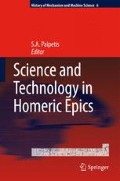Euclous, the very ancient soothsayer, also called Empyrivitis, had predicted that Homer “will be immortal and ageless for ever … ”. Indeed, humanity never ceased dealing with Homer. Even nowadays, in our materialistic society, Homer becomes more and more the object of studies, research, discussions, conferences, and symposia. From Japan to Scandinavia or Australia, Homeric poems editions succeed one another in ever increasing numbers and selling indices. For many centuries a great deal of researchers and commentators are dealing not only with the translation and commentary of the Iliad and Odyssey but also with the various so called Homeric questions, namely: Has Homer ever existed? What does the word Homer mean? Was “Homer” one or more persons hidden behind this name? Were there two poets, one who composed the Iliad and another who composed Odyssey or the same person composed both? If Homer was a real person, when did he live? Where was he born? Was Homer blind? Have Homer epic poems been written or have they been disseminated verbally? What is the Homeric Ithaca? Did Ulysses ever sail out to the ocean? We shall try to answer these questions briefly, based on ancient Greek literature, ancient commentators and of course on specific references of the Homeric poems themselves.
Access this chapter
Tax calculation will be finalised at checkout
Purchases are for personal use only
Preview
Unable to display preview. Download preview PDF.
References
Highet, J.The Classical Tradition, Oxford University Press, 1985.
Pantazis, D.E.Homeric Geography and Homeric Era: Homerization of Ancient Greece and the Mecenaean Problem, Kastaniotis Publ., Athens, 1996, p. 31 [in Greek].
Schadewaldt, W.Aufsätze und Auslegungen zur homerischen Frage(From Homer's world and work: The Homeric question), transl. into Greek, Ph. Kakrides, Educational Institution of National Bank of Greece.
Tziropoulou-Efstathiou, A.Homer, Telemachus' Son, Odysseides, Georgiadis Publ., Athens, 2003 [in Greek].
Bittlestone, R.Odysseus Unbound. The Search for Homer's Ithaca, Cambridge University Press, 2005.
Author information
Authors and Affiliations
Editor information
Editors and Affiliations
Rights and permissions
Copyright information
© 2008 Springer Science+Business Media, B.V.
About this chapter
Cite this chapter
Tziropoulou-Efstathiou, A. (2008). Homer and the So-Called Homeric Questions. In: Paipetis, S.A. (eds) Science and Technology in Homeric Epics. History of Mechanism and Machine Science, vol 6. Springer, Dordrecht. https://doi.org/10.1007/978-1-4020-8784-4_36
Download citation
DOI: https://doi.org/10.1007/978-1-4020-8784-4_36
Publisher Name: Springer, Dordrecht
Print ISBN: 978-1-4020-8783-7
Online ISBN: 978-1-4020-8784-4
eBook Packages: EngineeringEngineering (R0)

